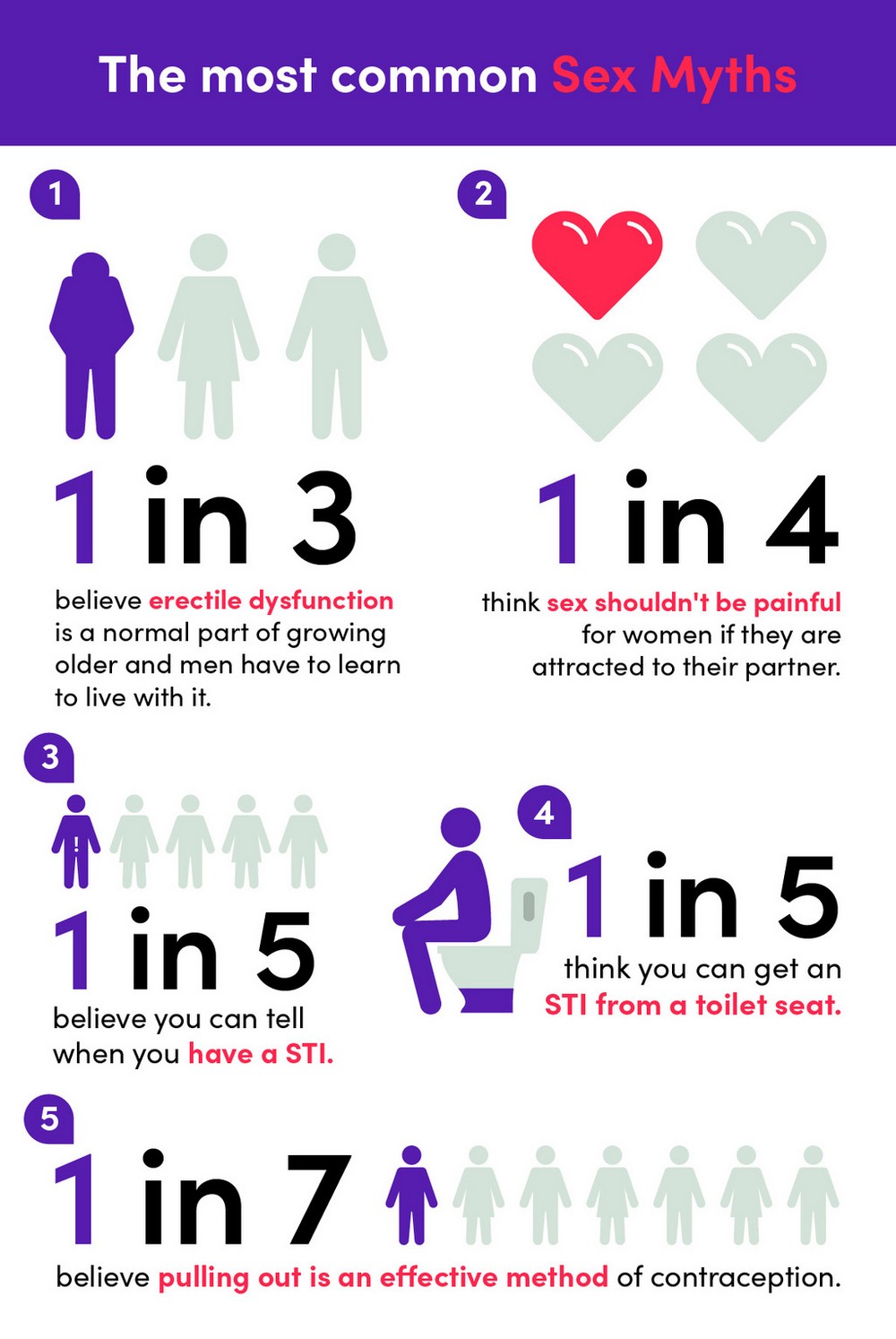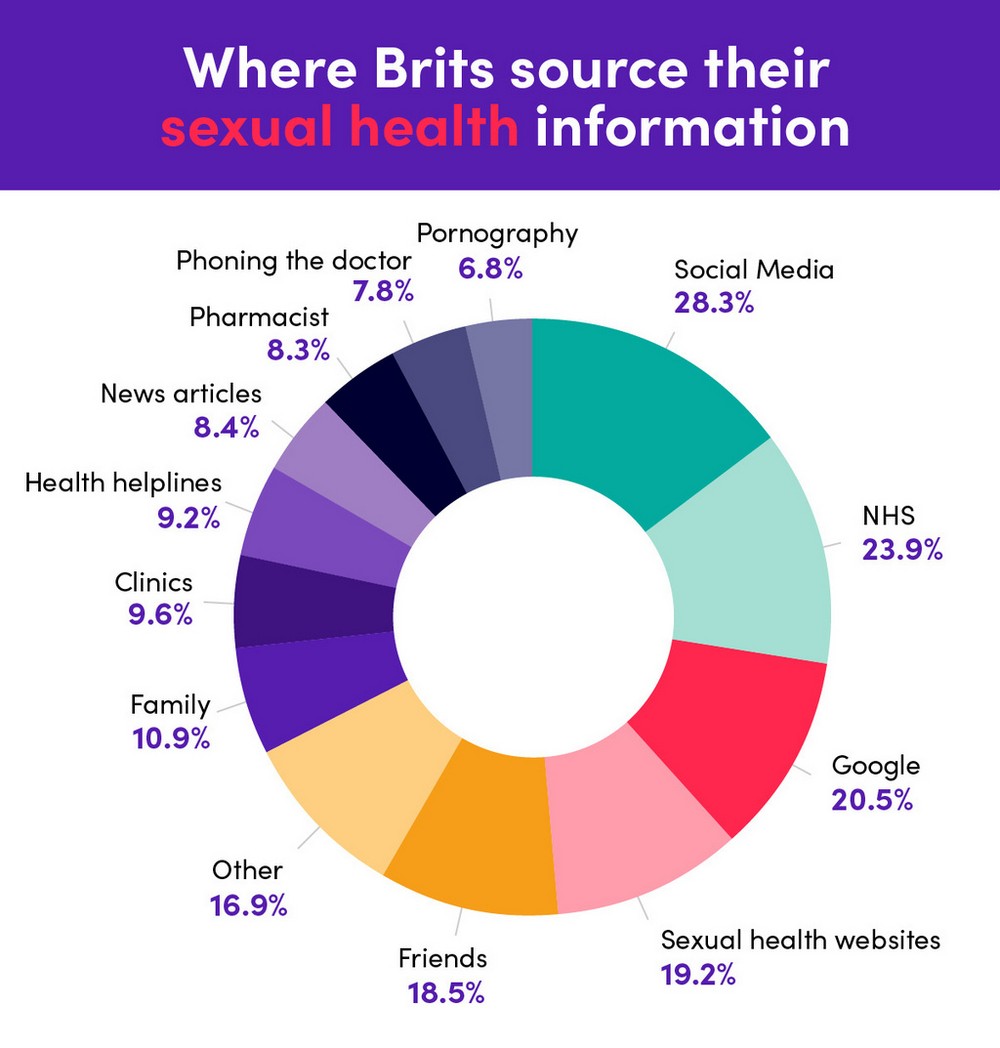Lovehoney’s Guide to Sex Education
on 20 Feb 2024
From penis problems to how STIs spread, there are plenty of sex-based ‘facts’ out there that are just plain false. Lots of us feel like the sex education we’ve received doesn’t cover enough about sexual health and wellness, and this has left us believing too many myths about our bodies, sex, and pleasure — well into our adult lives.
Not to mention, the rise of social media platforms like TikTok and Instagram has done nothing to dispel the circulation of sex misinformation. Lots of the content on these apps is created and shared by the average user rather than by professionals. This means we tend to see a lot of false information flying around — further fueling common misconceptions about our sexual health.
So, exactly what kind of sex myths are we talking about here? Well, we’ve surveyed the UK public to reveal what we’re most confused about when it comes to our sex education, and what we wish we’d learned sooner. To help curb the spread of misinformation, we’ve also partnered with sex expert, Ness Cooper, who has debunked these myths for us, sharing the sexual health information that we should have been privy to in the first place.
The top 5 sex myths believed by Brits
According to our research, it’s clear that there is no shortage of sexual misinformation circulating around the nation. So we have partnered with sex expert from The Sex Consultant, Ness Cooper, to debunk the top 5 most commonly believed sex myths in the UK.

1/ ‘Erectile dysfunction is a normal part of growing older and men have to learn to live with it.’
Believed by a third (34%) of Brits
‘Almost 70% of men/those with penises will experience erectile dysfunction by the time they are 70. However, we shouldn’t classify it as normal, as there are many reasons it can affect an individual and these can vary from person to person.’
‘Anyone experiencing erectile issues should see a medical professional to find out the cause. Once the cause of erectile dysfunction is found, whether that is psychological, physical, or a mixture of both, there are many treatment methods to help manage symptoms. Even if you are experiencing erectile issues, it doesn’t have to be the end of enjoying sexual pleasure, as there are many things you can explore without needing an erection.’
Ness’s tip: Sex toys can help those experiencing erection difficulties ‘When using sex toys designed for the penis some can help maintain erections, and even help increase satisfaction from other forms of sexual stimulation. Devices such as cock rings and penis pumps, and penis sleeves have been found to be beneficial for those experiencing erection difficulties, but it’s always best to visit a healthcare professional when these issues do arise.’
2/ Sex shouldn't be painful for women if they are attracted to their partner
Believed by over 1 in 4 (27%) Brits
‘Being attracted to your partner doesn’t stop sex from being painful if you’re experiencing pain during penetration. If you are attracted to your partner it can mean you become aroused easier when thinking about or being with them, and this can lead to producing more vaginal lubrication naturally, but may not solve intercourse-related pain. There are many reasons someone may experience pain during penetration but whether or not you’re attracted to someone isn’t one of them.’
‘With communication, you may be able to discuss foreplay, additional lubricant, or alternative sexual methods you both may enjoy that aren’t painful. If sex is still painful, it’s best to speak to a healthcare professional to find out why.’
3/ You can tell when you have a STI
Believed by 1 in 5 (21%) Brits
‘Sometimes STIs can go unnoticed due to the incubation time before they really become active in the body. Even when an STI is active and showing up on test results, there aren't always symptoms. This is why it’s important to get tested regularly as we can’t always tell if we have contracted one.’
4/ You can get an STI from a toilet seat
Believed by almost 1 in 5 (18%) Brits
‘STIs don’t spread on toilet seats, and ones that spread through contact of bodily fluids don’t survive outside of the body long enough to be transmittable through sitting on them on a toilet seat.’
‘The fear of Sexually Transmitted Infections being transmitted via toilet seats has been going around for far too long. Part of this is due to lack of information and incorrect sex education, leading to stigma and misinformation.’
5/ Pulling out is an effective method of contraception
Believed by 15% of Brits
‘Whilst precum often only contains trace amounts of active sperm, there is a possibility someone could get pregnant from penetration that has pre-ejaculation. This means that the pull-out method isn’t always reliable.
‘It’s best to always use another method of contraception if aiming to avoid pregnancy, and the use of a barrier method such as condoms to avoid spreading STIs.’
Almost 1 in 3 Brits do not seek sexual health advice from any source - but 1 in 10 men get it from porn
Our survey revealed that when it comes to sexual health information, close to one in three Brits do not seek sexual health advice in any way, on any platform. When analysing where those who did seek sexual health information looked for it, the most commonly used source was the NHS website (24%) and Google (20%).
However, worryingly, 7% of correspondence admitted to sourcing their sexual health information from Facebook while 6% used social media platforms Tiktok and Instagram. It was also found that men are twice as likely to seek sexual health advice on Facebook compared to women and, shockingly, one in ten men admitted they take sexual advice from porn.

The danger of sex myths
The number of individuals who source their sexual health advice on social media or porn is concerning and Ness Cooper states, ‘Sex myths can be harmful because of the misinformation and stigma around them. When sex myths are believed, they can prevent individuals from understanding their sexual wants and needs, as well as prevent them from seeking help and advice when needed. This can lead to unfulfilling sexual encounters and increase risks of unsafe sexual practices where STIs can be spread easily’.
Top 10 things Brits wish they had learned sooner about sex
As many of us are forced to navigate and learn about sex on our own, it’s no surprise how much information about our sexual health, wellness and pleasure we wish we would have learned earlier. Our research revealed that almost one in ten Brits did not begin to enjoy sex until they were between the ages of 35 and 44, and the trend continued as 7% reported not enjoying sex until they were over the age of 45. So when asking what the nation wished they had learned sooner, their responses were unsurprising:

1/ Understanding the importance of communication and speaking up about what you like was the number one thing that the nation wished they would have learned sooner, as 30% of those surveyed agreed.
2/ Feeling sexy in your own skin was one of the most popular lessons for women, with a third (33%) agreeing compared to only 19% of men.
3/ Those who identify as non-binary wish they knew sooner that they didn’t need to force themselves out of their comfort zone (36%) - the highest-rated lesson for this group.
4/ One quarter of Brits wish they would have known that they should not be ashamed of what they find pleasure in, and 17% of respondents wish they would have known it’s totally normal to have kinks. Sexual pleasure comes in many forms, and you should feel comfortable and happy to explore this.
5/ Knowing that it is okay to say ‘no’ was another popular learning among women (26%), non-binary individuals (25%) and men (16%), and we cannot stress the importance of this enough. Stay within your comfort zone and communicate with your partner(s).
6/ Experimenting with sex toys in the bedroom is not to be shied away from, and 22% of Brits wish they would have known this sooner, while 16% say they wish that they would have known that it’s totally normal to use lube in the bedroom.
Ness’s tip: “Vibrations from a sex toy can help increase vaginal lubrication and encourage blood flow to the genitals, and this can help make penetration easier. They can be particularly useful for individuals experiencing sexual response changes due to menopause.”
7/ Over one in five Brits (22%) agree that they wish they would have known that orgasm doesn’t need to be the goal of sex, and it’s okay not to climax and still enjoy yourself.
8/ The greatest learning for men was how to make their partner climax, with almost 30% of male participants agreeing, compared to only 16% of females.
9/ Understanding the importance of consent is incredibly important, yet one in five people feel they didn’t know this soon enough.
10/ Many know that porn sets an unrealistic standard for sex, yet one in five wish they would have understood this sooner.
Methodology
The survey data in this study was based on a survey of 2000 adults in the UK who have previously had sex, which took place in November 2021.
Gender splits are based on respondents choosing how they identify.
Sources
